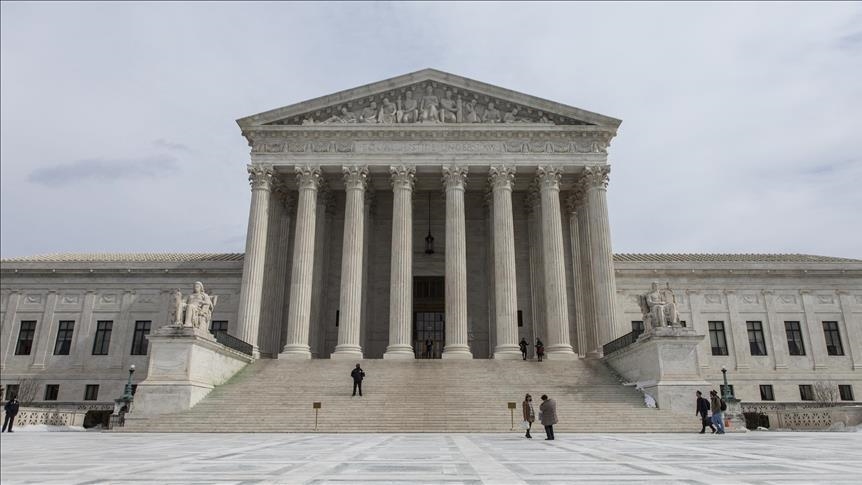55th anniversary of Loving v. Virginia: US Supreme Court case struck down laws banning interracial marriage
‘It really is a true story of love and the conquest of love over evil,’ says constitutional law professor Richard Albert

HOUSTON, Texas
In June 1958, during the heart of the US Civil Rights era, a young couple in the state of Virginia committed a crime when they fell in love and got married.
Richard Loving, a white construction worker, and Mildred Jeter, a mixed Black and Native American woman, exchanged wedding vows in Washington, DC where interracial marriage was legal.
But upon returning to Virginia, the couple was arrested under the state’s Racial Integrity Act of 1924, which criminalized marriage between white and colored people.
The Lovings were convicted of violating the state’s anti-miscegenation law banning interracial marriage and sentenced to 1 year in prison. The sentence was suspended on the condition they would leave Virginia and not return for at least 25 years. The couple was then forced to relocate to Washington, DC where they lived in exile.
“They pleaded guilty because they couldn’t prove they were either both black or both white,” said constitutional law professor Richard Albert of the University of Texas at Austin School of Law.
“They were both convicted in the state of Virginia,” Albert told Anadolu Agency. “They filed an appeal to the Supreme Court of Virginia and lost when the court upheld their original conviction, so they filed an appeal to the US Supreme Court.”
The Lovings argued that the Virginia law violated the Equal Protection Clause of the 14th Amendment to the US Constitution, which declared that no state shall “deny to any person within its jurisdiction the equal protection of the laws” including the right to marry.
“I think these are two people who loved each other and wanted to be together,” said Albert. “They also wanted to ensure equal treatment of people irrespective of their race.”
The Loving v. Virginia case made its way to the Supreme Court in April 1967.
During the proceedings, Virginia argued that its law was not in violation of the 14th Amendment because the punishment was the same regardless of race and therefore “equally burdened” whites and non-whites.
The Lovings’ attorneys argued that Virginia’s marriage law was rooted in racism and white supremacy and were “slavery laws, pure and simple.”
To give some perspective as to where Loving v. Virginia comes into play regarding racial equality and inequality in America, Albert points to the 1896 Supreme Court case of Plessy v. Ferguson which set a precedent for equality in the US for decades. That ruling said racial segregation laws did not violate the Constitution as long as the facilities for each were “separate but equal.”
“Loving v. Virginia comes around after the Supreme Court has already planted its flag for equality,” said Albert. “But can you treat people equally under the US Constitution if you segregate them?”
On June 12, 1967, the Supreme Court unanimously voted 9-0 to strike down Virginia’s anti-miscegenation statute, asserting that the state’s interracial marriage law violated the 14th Amendment.
“Under our Constitution, the freedom to marry, or not marry, a person of another race resides with the individual and cannot be infringed by the State,” Chief Justice Earl Warren wrote in the ruling. “These convictions must be reversed.”
The landmark ruling overturned the Lovings’ original criminal convictions. More importantly, Loving v. Virginia struck down laws banning interracial marriage in 16 US states, including Virginia.
“Loving v. Virginia was a step further in the demolition of the infrastructure of inequality of the original US Constitution,” said Albert. “Fate chose them to be the vehicle to bring equality to everyone in the country.”
Albert said the case continues to set precedents for equality in modern times
“It just so happens that Loving v. Virginia is about marriage,” he said. “But the principle goes beyond that. It’s about equal opportunity.”
Loving v. Virginia was cited as a precedent in the 2015 Supreme Court case of Obergefell v. Hodges, which established same-sex marriage throughout the US by ruling that all states are required to issue marriage licenses to same-sex couples and to recognize same-sex marriages validly performed in other jurisdictions.
“Because Loving v. Virginia says you have to treat people equally and give them the same opportunity,” said Albert. “Loving continues to resonate in our time because it stands for a ringing declaration of equality that reverberates today.”
Albert says Loving v. Virginia is a wide-reaching proclamation that sets precedence involving current legal issues in American society, including the rights of the LGBTQ (Lesbian, Gay, Bisexual, Transgender, Queer) community.
“The right to equality is both an actual right and an aspirational right,” said Albert. “If you aren’t treated equally today, you can go to court to demand to be treated equally. And the rights to equality are what people are fighting for today and for the next generation.”
Richard Loving died in 1975. Mildred Loving passed away in 2008. But the legacy of their landmark case lives on in the present, as it continues to affect social change and improvement in US laws.
‘It really is a true story of love and the conquest of love over evil,’ said Albert. “There will always be inequality battles to be fought … and Loving v. Virginia sets a precedent so more people can have the opportunity for equality.
“There can never be enough opportunities for equality in the United States,” he added.
Anadolu Agency website contains only a portion of the news stories offered to subscribers in the AA News Broadcasting System (HAS), and in summarized form. Please contact us for subscription options.

